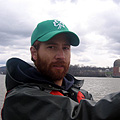Associate Professor of Biology
PhD Stony Brook University
BA College of the Atlantic
Tel: 269.337.7386; Office: Dow 327
Email: Santiago.Salinas@kzoo.edu

- 2021-present Associate Professor of Biology, Kalamazoo College, Kalamazoo, MI
- 2018 Robert F. and Harriet G. Varney Assistant Professor of Biology (3 year endowed professorship)
- 2015-2021 Assistant Professor of Biology, Kalamazoo College, Kalamazoo, MI
- 2014-2015 Visiting Assistant Professor, University of the Pacific, Stockton, CA
- 2012-2014 Post-doctoral Scholar, University of California Santa Cruz, Santa Cruz, CA
Research Interests
In the K Fish Lab, we study the various ways in which populations cope with changes in the environment. Most organisms have to cope with constant fluctuations in, e.g., temperature at various time scales (daily, seasonally, annually). An important mechanism that facilitates coping with these changes is phenotypic plasticity, the potential for an organism to produce different characteristics under different environments. Further, in some species, parents can predict the environment their offspring will experience and get them ready for it — a biological head start of sorts. This is known as transgenerational plasticity (or cross-generational plasticity/transgenerational acclimation/maternal environmental effects) and is also part of our research focus. We study how within- and across-generation plasticities work and how they interact with local adaptation in an ecological context. We work primarily on fishes, mostly because we know how to keep them alive and happy.
Current Courses
BIOL123 Form and Function with Lab
BIOL222 Vertebrate Biology with Lab
BIOL376 Human Physiology with Lab
BIOL495 Evolutionary Ecology
Selected Publications
(* denotes undergraduate coauthor)
Hirakawa, K.A.* and S. Salinas. 2020. Domesticated and wild fathead minnows differ in growth and thermal tolerance. Journal of Thermal Biology 94:102784.
Lee, W.-S., S. Salinas, Y.-R. Lee, J.A. Siskidis, M. Mangel, and S.B. Munch. 2020. Thermal transgenerational effects remain after two generations. Ecology and Evolution 10:11296-11303.
Salinas, S., S.E. Irvine*, C.L. Schertzing*, S.Q. Golden*, and S.B. Munch. 2019. Trait variation in extreme thermal environments under constant and fluctuating temperatures. Philosophical Transactions B 374:20180177.
Donelson, J.M., S. Salinas, P.L. Munday, and L.N.S. Shama. 2018. Transgenerational plasticity and climate change experiments: where do we go from here? Global Change Biology 24:13–34.
Salinas, S. and S.B. Munch. 2015. Where should I send it? Optimizing the submission decision process. PLoS ONE 10:e0115451.
Salinas, S. and S.B. Munch. 2014. Phenotypic complexity: integrated responses of life history characters to multiple environmental factors. Evolutionary Ecology Research 16:267-284.
Salinas, S., S.C. Brown, M. Mangel, and S.B. Munch. 2013. Non-genetic inheritance and changing environments. Non-Genetic Inheritance 1:38-50.
Salinas, S. and S.B. Munch. 2012. Thermal legacies: transgenerational effects of temperature on growth in a vertebrate. Ecology Letters 15:159-163.
Munch, S.B. and S. Salinas. 2009. Latitudinal variation in lifespan within species is explained by the metabolic theory of ecology. Proceedings of the National Academy of Sciences USA 106:13860-13864.
